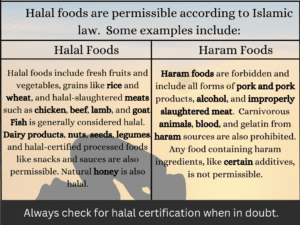Halal and haram are terms that are familiar and essential to the existence of every Muslim, as they pertain to the right path and things prohibited by the Islamic religion. As the global market expands, it becomes pertinent to learn how these concepts can be applied to food and most products. To assist you in this endeavor, this guide will guide you towards a nuts and bolts apprehension of halal and haram products so that it will be easier for you to make better choices and live according to the principles that the religion has dictated.
When is something Halal or Haram?
Halal, by definition in Islamic law, is a term that defines anything lawful or permissible. This can range from food products, beauty products, medicine, or even the money you flow in and out of your pocket. On the other hand, haram means something unlawful or prohibited in Islamic law.
A product is considered halal when:
It has no banned products (such as pork or any form of alcohol).
Again, regarding meat, it has to be kosher, which in Islam is done through Halal or Dhabi.
The following is that no exploitation or evil deeds are associated with the sourcing of the product.
Haram products include:
It may include products derived from pork, including pork meat, bacon, and pork sausage.
- Any food and drink that contain alcohol in them or are prepared with alcohol.
- Every financial product containing interest is also known as rebbe in Islam, which is prohibited.
- Food: That is how people distinguished between Halal and Haram ingredients.
In food, the most application of the terms halal and haram. Therefore, for any food to be halal, some features need to be exercised while purchasing these products. - Meat: Halal meat is meat that is obtained by slaughtering the animals, where a prayer is being recited when slaughtering the animal. The blood should be removed altogether from the animal’s respective body. That which is not killed in this way is prohibited, and pork, in any form, is not permitted.
Common Haram Ingredients: Most packaged foods have ingredients that are considered forbidden. These include:
- Gelatin: Present in sweets, cakes, and yogurts, gelatin is known to be produced from pigs or other non-halal animals.
- Alcohol: It is also haram in any quantity when incorporated in flavorings, sauces, and some beverages.
- Enzymes and Rennet: These may be in the production of cheese and may be obtained from animal product/s that are not halal if, for instance, the animal was not slaughtered according to Islam.
- Processed Foods: That is why, when purchasing processed foods, one should investigate whether they passed the halal certification test, as most contain non-halal additives. As much as possible, 502 people should avoid buying food products that do not display credible halal symbols to indicate that they were processed and prepared according to the rules of Islam.
Halal and Haram Products: Making Informed Choices.
In regard to our food choices, there are things that are allowed (halal) and things that are prohibited (haram) for many individuals. Here is a list of general halal and haram products for a friendly look at most of your choices in the market.
Halal Products: Halal products are products that conform to Islamic law of dietary, and yes they are normally secure and healthy products. Some popular halal choices include:
- Chicken: Most people have incorporated chicken into their diet plans; ensure that you buy a bird that was processed through halal methods.
Beef: Plucked by many, just ensure it has been gotten from a halal-certified farm. - Fish: While most fish are halal, always ensure you do not find out that other ingredients make the fish non-halal.
- Olive Oil: A healthy, tasty complement to your recipes and dishes, ideal for use in cooking or other as a dressing.
- Honey: A completely natural product used to sweeten foods and drinks from tea and coffee to cookies and cakes.
- Dates: In addition to being crunchy and mostly tasty, they’re preferable during the year’s fast-breaking season, Ramadan.
- Milk: However, to have peace of mind make sure it comes from halal-certified animals.
- Rice and Grains: Base ingredients that are normally always halal which can be incorporated in the preparation of other meals.
Haram Products: On the other hand there are products that a firm is prohibited from producing or marketing. These include:
- Pork: This type of meat is not halal and not allowed in the Islamic diet so this cannot take place.
- Alcohol: Beer, wines, spirits, and all types of fermented liquors are strictly banned as they increase.
- Gelatin: A common food additive for candies and desserts, gelatin is produced from non-halal sources – it would be wise to avoid it.
- Bacon and Ham: It can be obtained both from pigs and is Halal.
- Lard: This animal fat from pigs is another commodity into which one should not get into with any intent of using it.
- Non-Halal Meat: This is the kind of meat that is not prepared according to the Islamic method of slaughter.
Cosmetics and Personal Care: What to Watch For
Most of the population is unaware that these cosmetic products are also prohibited if they have a type of haram ingredient in them. From the face cleansers and the lipsticks, it is high time we looked into what is put into those products.
- Alcohol in Cosmetics: Most fragrances, lotions, and toners contain alcohol. As we have already pointed out, not all alcohols are forbidden. However, it is prohibited to take any kind of alcohol that makes you drunk, for example, Ethanol. If your diet allows it, you can try to look for alcohol-free or halal options where available.
- Animal-derived Ingredients: Preservatives, emulsifiers, and other materials used in cosmetics, such as collagen and glycerin, may be of animal origin. If these animals are not slaughtered in the correct halal manner, then the products are forbidden or haram. Meat or natural products are mostly a preference for more dangerous varieties of nutrients.
- Halal-Certified Beauty Products: A rising trend for Halal cosmetics is based on the forefront providing evidence-based consumer products that are ts compliant with Islamic laws on halal standards for raw materials and production. They also indicate that the products are not tested on animals and are processed through the correct Islamic ethical perspective.
Pharmaceuticals: Hoping to choose ‘Halal’ options in medicine consciously
Daily medicines and vitamins contain some compounds like gelatin or alcohol that become a problem for Muslim people.
- Gelatin in Capsules: A capsule and vitamins usually contain gelatin coating, and many medicines use gelatin. This is true. The gelatin is sourced from pork or other animals, not duly halal and, the product becomes haram. If possible, choose a product where animal products are not used or are used only minimally.
- Alcohol in Medicine: It is known that some liquid preparations contain alcohol as a solvent or stabilizer. In case you require taking a medicine containing alcohol, but there are no available halal substitutes. Islamic law permits it under circumstances of necessity, especially when so much is necessary for health.
- Consult Your Doctor and Scholar: To be on the safer side, one should seek the doctor’s advice and, at the same time, talk to an Islamic scholar regarding the particular medicine. Many times, the medication is inevitable, and no halal forms are available in the market; thus, it could be acceptable to take.
Financial Products: Managing Your Transaction Without Committing Zina
We can also see a reproduction of Islamic principles in financial products. Standard Islamic leases do not allow for triple net leases (the tenant is not expected to pay over and above rent for maintenance and other utilities), and certain kinds of loans, mortgages, or banking products are forbidden (haram).
- Interest-Free Financing: Islamic finance has other acceptable solutions in terms of Shariah. For instance, the Murabaha or Ijara financing facility of Islamic banks is in place to offer interest-free mortgages, and, as far as savings, current accounts, and investment facilities are concerned, it also excludes the use of riba.
- Ethical Investments: Businesses and companies that deal with products such as alcohol and gambling are forbidden to be invested in. Islamic investments address the ethical business issue and avoid industries prohibited by Islamic Shariah law.
How to know HALAL Products
Finding halal products can be facilitated using available solution information technologies and certifications. Here are a few tips to simplify the process:
- Look for Halal Certification: Halal-certified products amount to a seal of approval from the Halal Monitoring Authority (HMA) or the Islamic Food and Nutrition
- Council of America (IFANCA). These certifications also guarantee that the mega-product has been well scrutinized and complied with Islamic compliances.
- Use Halal Apps: Other applications, including Zabihah or Scan Halal, help identify halal foods by scanning a barcode and finding out whether the corresponding product is allowed. This can be very useful when shopping in stores that do not even have an aisle of halal products.
Conclusion: The documentary “Living Halal in a Modern World.
Knowing the distinctions between Halal and Haram products is essential for all Muslims trying to lead a moral life while following the teachings of Allah and his prophet. Consumers should be careful in the products they choose in their fight for purity and moral high standards in food, cosmetics, medication, and finance.



